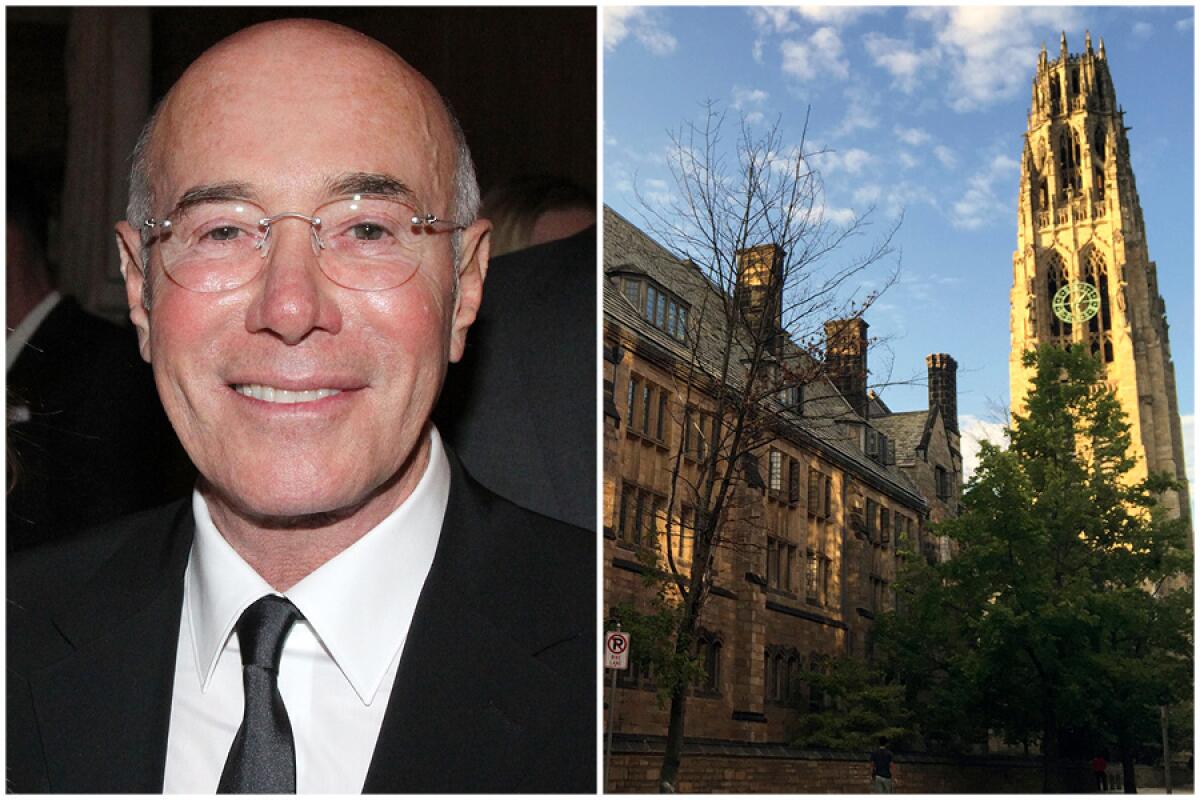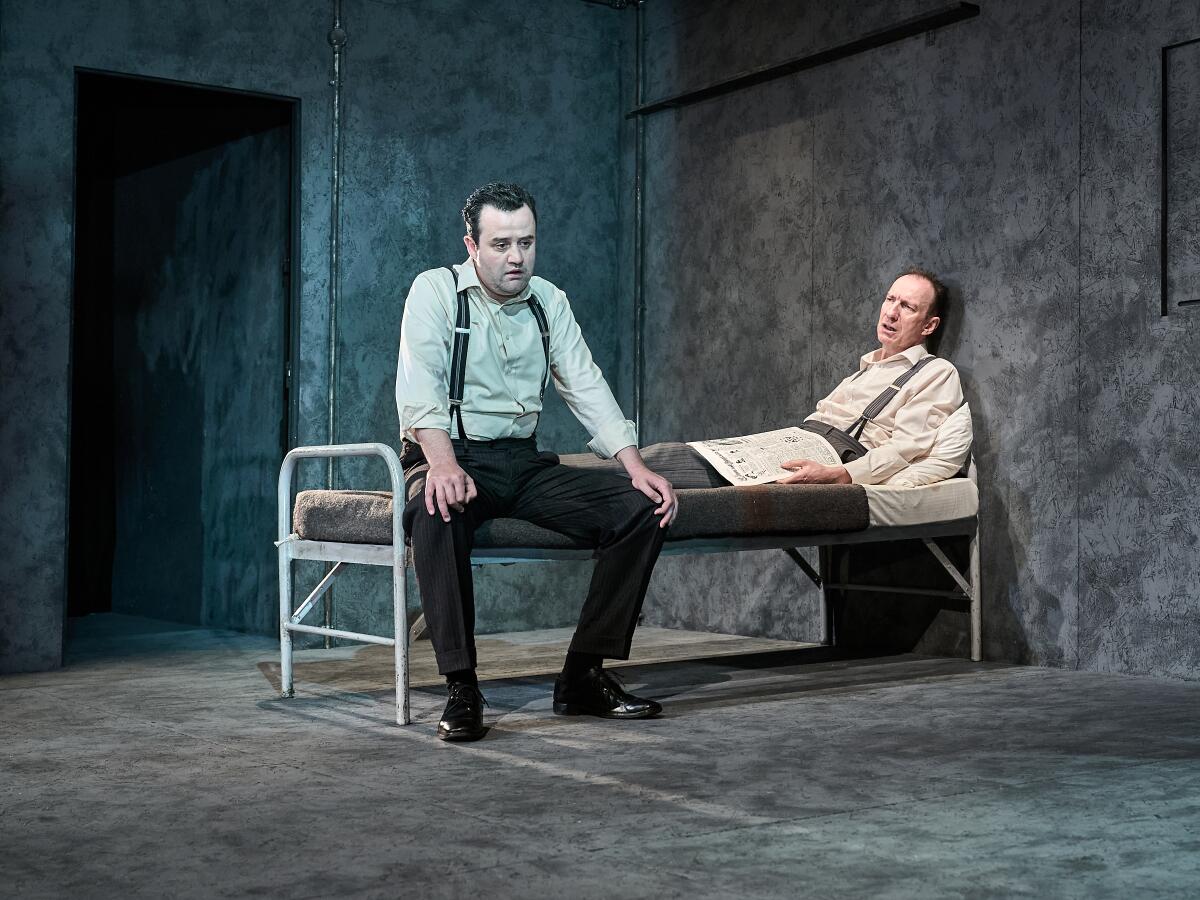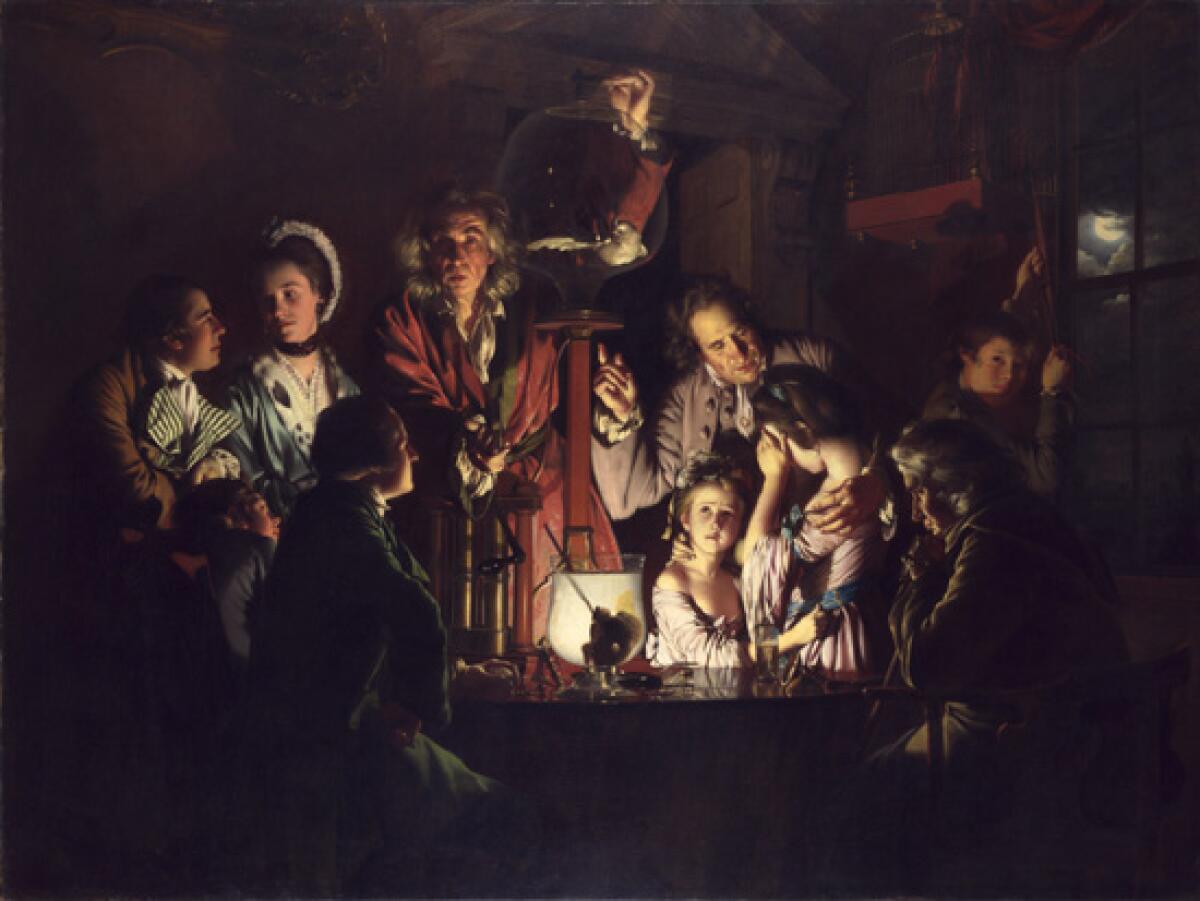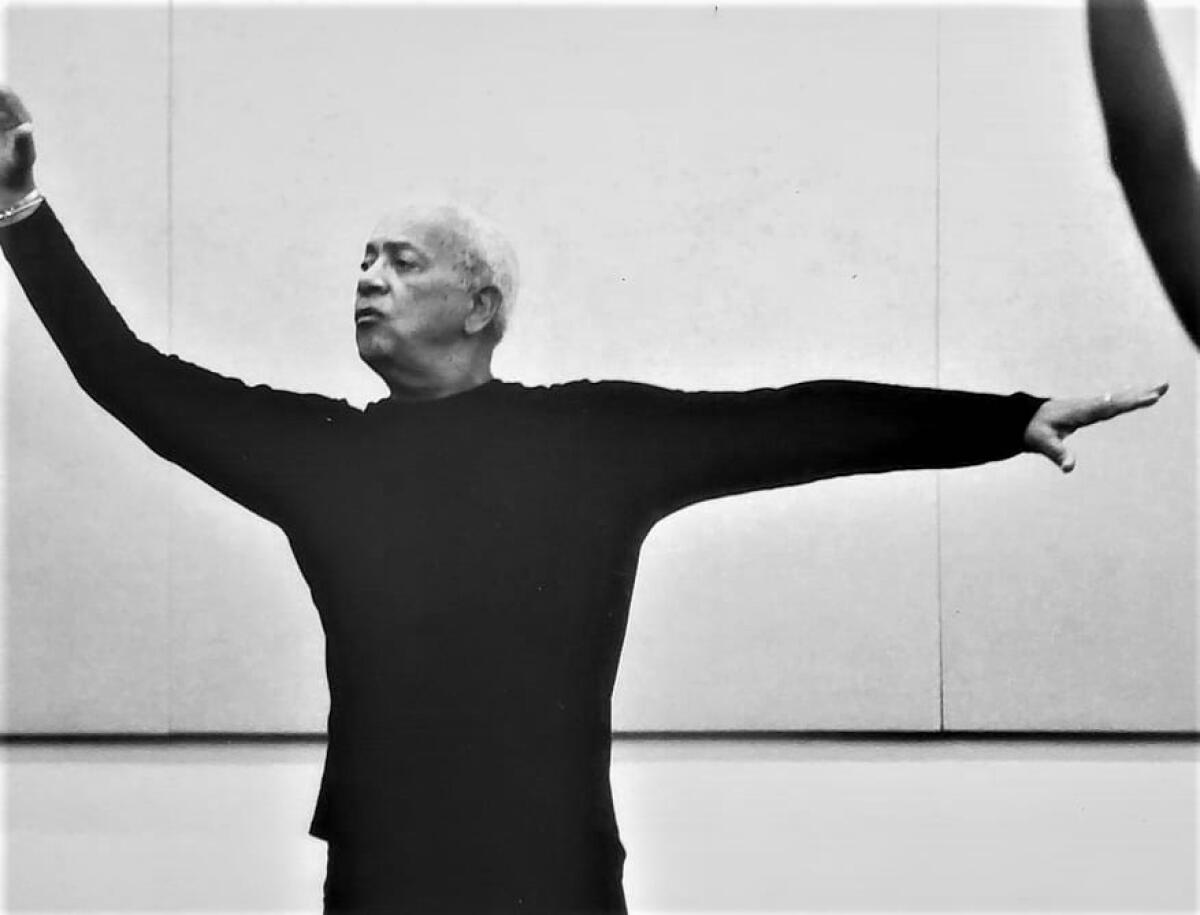Newsletter: David Geffen gives $150 million to Yale School of Drama. Not everyone is thrilled

Hello, I’m theater critic Charles McNulty, filling in this week for Carolina A. Miranda. Summer’s here, but the arts in Southern California, finally awake from their enforced slumber, haven’t left for the beach. Traffic is back, and after more than 16 months, I know the price of gas again. But you’ll get no complaints out of me. After finishing the superb French spy series “The Bureau” — for my money, the most absorbing long-form TV drama since the “The Sopranos” — I’m ready to put down the remote control and leave the house again.
But first, allow me to address some news rippling through the theater world concerning my alma mater.
A name game
It might seem like the height of bad manners to look askance at a philanthropic gift of $150 million, but not everyone was popping Champagne at the announcement of David Geffen’s recent donation to the Yale School of Drama.
The news that the school would be permanently tuition-free for all students was a cause for celebration. Questions about which students would stand to benefit most from the change were raised — as was the issue of giving young trust-fund thespians (not an unknown breed at Yale) a windfall — but the move to make an elite drama school education more accessible was roundly cheered.
No, the reason this luxurious gift horse was being looked in the mouth was that it came with a hitch: The Yale School of Drama — famous for having trained Meryl Streep, Sigourney Weaver, Lupita Nyong’o and generations of renowned playwrights, directors, designers, producers and critics — is now officially the David Geffen School of Drama at Yale University.
Alumni and many faculty members felt blindsided. The Yale School of Drama is a storied institution, built on the contributions of its graduates to the American theater, not a fungible brand to be put up for auction.
When asked via email whether the name change poses any dangers to the school’s identity, James Bundy, dean of the School of Drama, downplayed the issue. “No more than an actor changing their name threatens their identity,” he replied, in an analogy that seemed to disprove his point.
This trading on an institution’s cultural prestige, while common practice on campuses across the nation, marks something of a departure for Yale, which has bestowed the names of donors on buildings and institutes but has hitherto avoided rechristening its most illustrious professional schools after benefactors.
When asked for a comment, Yale President Peter Salovey said that “Yale has a long history of honoring donors in this way.” But he did acknowledge that “Yale’s trustees made a decision not to name residential colleges after living donors.” And while the School of Drama may not be the first professional school to be named after a donor, the example he cited was the hardly analogous case of the university’s Jackson Institute for Global Affairs, which won approval to become the Yale Jackson School of Global Affairs, starting in fall 2022.
The Yale School of Music, another educational jewel in the university’s portfolio, went tuition-free after a gift from Stephen and Denise Adams in 2005 that didn’t require a name change. The School of Drama didn’t get as selfless a tycoon.
David Callahan, founder and editor of Inside Philanthropy and author of “The Givers: Wealth, Power, and Philanthropy in a New Gilded Age,” described Geffen to me in an email as “one of the more ego-driven mega-donors on the scene right now — making huge gifts to elite institutions with naming rights attached.”
“What’s less clear,” he added, “is how interested he really is in what those institutions do.”
But, to quote Shakespeare, “what’s in a name?” Quite a lot, it turns out, in these days of societal reckoning.
According to Amir Pasic, dean of the Lilly Family School of Philanthropy at Indiana University–Purdue University Indianapolis, “Gifts have a lot more symbolic impact in our society right now. Who are we lifting up? What does that mean about who we are? I think these questions are much more salient than they were 25 years ago when money was just money. You would get it and it was not seen as problematic. That is not the way we look at things now. Students and alumni are much more critical.”
On Twitter, Stephanie Ybarra, artistic director of Baltimore Center Stage and a School of Drama graduate, made her displeasure known: “$150 million dollars later, tuition is free for Geffen students, which is thrilling. But the true cost of erasure and doubling down on enshrined whiteness? #RIPYSD.” Another distinguished alum challenged the hypocrisy of the name change at a time when the school has expressed a “commitment to decolonization.”
Asked about this criticism in a Zoom interview, Bundy responded, “I think this gift is a spectacular example of philanthropy in the literal sense, love of humankind, and that it comes from somebody with a deep appreciation and background in popular culture, in driving popular culture. And I’m incredibly moved by that generosity and by that mobilization of privilege on behalf of the many, many artists who will benefit from it.”
For associate dean Chantal Rodriguez, who joined the Zoom interview with Bundy, “it’s really about increasing access and what this gift is able to do.” She’s particularly relieved that the school is now “tuition-free in perpetuity ... because as the economy changes, or as things change, that will never be impacted.”
But for low-income students, tuition was already essentially covered. According to the School of Drama website, “As of 2019, the average student with demonstrated high financial need receives from the School work-study employment, scholarship grants, and living expense scholarships, providing 90 percent of the cost of attendance over three years.”
One alum, so upset that the gift not only fails to build “the much-needed and long-postponed new theater and home for the school” but also “will benefit those students and family who can afford to pay tuition,” emailed to say that he had directed part of his “Yale testamentary gift to the drama school but will now change it so all goes to the university at large.”
No one is arguing that the gift won’t do enormous good in lowering the indebtedness of all students — rich, middle-class and poor. The question is whether the tuition-free headline was designed to forestall a deeper examination of the decision to barter away the school name.
Gordon Rogoff, a distinguished theater critic and retired faculty member whose history with the School of Drama extends back to the Robert Brustein era, called the renaming of a Yale graduate program “corrosive ... not least because ‘Yale’ is now an afterthought, to say nothing about those of us who don’t wish to confuse young minds about intellectual and artistic achievement. Nobody in the school should be encouraged to fashion his or her or their life on Geffen’s model.”
Bundy was not at liberty to disclose the terms of the deal with Geffen, whether alternatives (such as offering to name a building or theater after him or negotiating a term limit to the renaming) were attempted, or even if the money was going into an endowment that would generate annual funds. He was clear, however, of the enormous good that would come from a gift that is reportedly “the largest on record in the history of American theater.”
The “tuition-free” message, he elaborated in an email, makes “clear to any prospective applicants that graduate training at Yale is accessible. ‘Need-based aid,’ as important as it is, doesn’t necessarily communicate that to the broadest possible audience, specifically because there are several prominent schools offering need-based aid in the form of loans, and regularly leaving students with debts of $100,000 or more. We expect to see the number of applications and socioeconomic diversity of the applicant pool change meaningfully, including people who might never have imagined training at Yale would be affordable.”
That’s a vision everyone can get behind, but could less compromising terms not have been found? A friend of mine who’s an executive director of an academic nonprofit shared his philosophy with me: “If the money’s green, take it and try to do good things with it.” But symbols matter because history matters, not least for defining the values of an institution’s future path.
Make the most of L.A.
Get our guide to events and happenings in the SoCal arts scene. In your inbox once a week.
You may occasionally receive promotional content from the Los Angeles Times.
Old plays, new players
In other theater news, audiences have returned to Will Geer’s Theatricum Botanicum, where I reviewed two Shakespeare productions, “Julius Caesar” and “A Midsummer Night’s Dream.” The theater’s Topanga setting is idyllic and the communal feeling in the audience is intoxicating, if only the actors could settle into Shakespeare’s language and make it their own.

“The Dumb Waiter,” an early Harold Pinter play, received a welcome revival, courtesy of the Old Vic: In Camera series. The production, directed by Jeremy Herrin and starring Daniel Mays and David Thewlis, was a straightforward affair, faithful to the playwright’s precise vision. As I noted in my review, there was no need to import relevance. Pinter’s scrutiny of the language of power relations is never out of style.
Art moves
A busy week in art news began with The Times’ Jessica Gelt’s reporting on three L.A. artists who are among the first winners of a $5 million Latinx Artist Fellowship program. Carolina Caycedo, rafa esparza and Christina Fernández will each receive $50,000. “The Latinx Artist Fellowship, as Gelt notes, “seeks to heighten the visibility and impact of Latinx visual artists by funding what it has identified as some of the most compelling Latinx artists working in America.”
Times art critic Christopher Knight has the skinny on a proposed swap, in which the Huntington Library, Art Museum and Botanical Gardens would loan “The Blue Boy” in exchange for a monumental work by Joseph Wright of Derby. According to Knight, Wright’s painting, “An Experiment on a Bird in the Air Pump,” “transforms Caravaggio’s theatrical chiaroscuro lighting technique, popularized in the 16th and 17th centuries as a religious simile for spiritual illumination, into a metaphor of rational enlightenment.”

The Times’ Deborah Vankin has the news on who will be leading the Cheech Marin Center for Chicano Art & Culture of the Riverside Art Museum, which is set to open May 8. María Esther Fernández has been named artistic director, “the center’s top post and the person who will steer the curatorial and programming visions for the project under development in the former Riverside Public Library.” The center, writes Vankin, features “Marin’s personal collection of about 700 items along with works on loan from artists, collectors and other institutions. It will also present traveling exhibitions.”
Vankin also has word from the Hammer Museum that L.A. artist Kandis Williams, co-founder of Cassandra Press and a visiting faculty member at the California Institute of the Arts, will receive the Hammer Museum’s $100,000 Mohn Award for artistic excellence. Two other awards were also announced: The Career Achievement Award, for “brilliance and resilience,” will go to painter Monica Majoli, and the Public Recognition Award will go to painter Fulton Leroy Washington, a.k.a. Mr. Wash. These artists will receive $25,000 each.
Enjoying this newsletter? Consider subscribing to the Los Angeles Times
Your support helps us deliver the news that matters most. Become a subscriber.
A dance-world loss
Makeda Easter reports on a significant loss in the dance world. Donald “Don” Martin, “a choreographer and teacher who preserved the legacy of modern dance icon Lester Horton,” died at 90 at his home in West Hollywood. A performer with Lester Horton Dance Theater in L.A. and an original member of Alvin Ailey’s American Dance Theatre, Martin “taught Horton technique to generations of young dancers at the Los Angeles County High School for the Arts.” He was also a friend of Maya Angelou, with whom he performed when she was traveling with her show to promote her album “Miss Calypso.”

A treehouse for Gramps
The “granny flat” craze continues, and I couldn’t help catch the bug while reading Times staff writer Lisa Boone’s piece on a design-savvy ADU (accessory dwelling unit) that maximizes backyard space. Although I haven’t yet reached my golden years, the photos in this story are setting up some inviting architectural possibilities for my future.
In other news:
One of my favorite bylines in literary journalism, New York Times book critic Parul Sehgal is headed to the New Yorker.
Beloved L.A. playwright and MacArthur fellow Luis Alfaro is returning to Center Theatre Group as an associate artistic director.
Broadway has announced an adventurous bill of highly imaginative documentary dramas: “Dana H.,” the Lucas Hnath play that had its world premiere at the Kirk Douglas Theatre, and “Is This A Room,” Tina Satter‘s fascinating reenactment of the transcript of the FBI investigation of Reality Winner, will share a stage this fall, alternating performances in an arrangement that suggests maybe the Great White Way is ready to step into the future.
My copy of “Putting it Together: How Stephen Sondheim and I Created Sunday in the Park With George” by James Lapine just arrived, so I know what theater book I’ll be reading during my vacation.
And last but not least ...
The trophy case for Lin-Manuel Miranda’s “Hamilton” is likely to get a little more crowded, reports Glenn Whipp. The Emmy nominations were announced Tuesday, and the film version of the show, which had its premiere on Disney+, is up for a slew of awards. “After all those other honors, does Miranda need an Emmy?” Whipp wonders. “Eh ... probably not as much as the Emmys need Miranda in the audience for the ceremony.”
The biggest entertainment stories
Get our big stories about Hollywood, film, television, music, arts, culture and more right in your inbox as soon as they publish.
You may occasionally receive promotional content from the Los Angeles Times.




